


FORUM FOR AFRICAN WOMEN EDUCATIONALISTS (FAWE) | 2024 - 2028 Strategic Plan| 1 Strategic Plan (2024-2028) Advancing Quality Education for Girls and Women in Africa

Advancing Quality Education for Girls and Women in Africa

FORUM FOR AFRICAN WOMEN EDUCATIONALISTS (FAWE) | 2024 - 2028 Strategic Plan| i
STRATEGIC PLAN 2024 - 2028

COPYRIGHT: This publication may not be reproduced for any purposes without prior written permission from FAWE. FAWE cannot be held responsible for any inaccuracies. Parts of this publication may be copied for use in research, advocacy, and education, provided that the source is acknowledged. ©FAWE Forum for African Women Educationalists (FAWE). 2024.

FORUM FOR AFRICAN WOMEN EDUCATIONALISTS (FAWE) | 2024 - 2028 Strategic Plan| 5 Table of Contents iii Acronyms and Abbreviations iv Acknowledgement V Foreword Vii Executive Summary Viii Introduction 1 1.1 Background 1 1.2 Contribution to Education Development in Africa 2 1.3 Process of Developing the 2024-2028 Strategic Plan 4 Who We Are 5 2.1 About FAWE 5 2.2 FAWE’s Track Record 7 2.3 Who we work with: Stakeholders and Partners 11 How We Work: Our Approach 17 3.1 Key Elements of our Approach 17 The Context 18 4.1 Overview 18 4.2 Key Education Indicators 18 4.3 Institutional Context –Gap Analysis 20 Our Theory of Change 22 Strategic Framework 23 6.1 Our Vision 23 6.2 Our Mission 24 6.3 Our Motto 25 6.4 Values and Guiding Principles 26 {Design and Layout: Altrac Communications Limited} Contents 01 02 03 04 05 06 07 08 6.5 Strategic Objectives 28 6.5.1 Strategic Objective I: To enhance provision and access to quality education and training opportunities for girls and women in Africa. 28 6.5.2 Strategic Objective 2: To Enhance Generation and Utilization of Research Evidence to Inform Education Policy and Practice. 30 6.5.3 Strategic Objective 3: To Strengthen Institutional Capacity and Enhance the Operational Effectiveness of the Fawe Network. 31 Implementation and Coordination 34 7.1 Financial Resource Needs 34 7.2 Resource Mobilization 35 7.3 Implementation of the Strategic Plan 35 7.4 Governance and Management 35 7.4.1 FAWE Africa Board 35 7.4.2 Regional Secretariat 35 7.4.3 National Chapters 36 7.4.4 FAWE Africa Alumni Network 37 Monitoring, Evaluation, Reporting and Learning 41 8.1 Overview 41 8.2 Monitoring 41 8.3 Evaluation 42 8.4 Reporting 42 8.5 Learning 43 Annexes 45 Annex 1: Key Activities & Performance Indicators 45
Acronyms and Abbreviations
ADEA Association for the Development of Education in Africa
AU African Union
CESA Continental Education Strategy for Africa
COVID-19 Corona Virus Disease 2019
FGM Female Genital Mutilation
GEM Global Education Monitoring
HIV Human Immunodeficiency Virus
M&E Monitoring and Evaluation
MERL Monitoring, Evaluation, Reporting, and Learning
MOE Ministry of Education
NCs National Chapters
NGO Non-Governmental Organization
PTA Parents Teachers Association
RS Regional Secretariat
SDG Sustainable Development Goal
SSA Sub-Saharan Africa
STEM Science, Technology, Engineering and Mathematics
STISA Science Technology and Innovation Strategy for Africa
TVET Technical and Vocational Education and Training
UNESCO United Nations Educational, Scientific and Cultural Organization
UNESCO UIS UNESCO Institute for Statistics
UNICEF United Nations Children’s Fund

iv | FORUM FOR AFRICAN WOMEN EDUCATIONALISTS (FAWE) | 2024 - 2028 Strategic Plan

Acknowledgement

We wish to express our heartfelt appreciation for all contributions to the development of the FAWE Strategic Plan 2024-2028. The commitment, expertise, and collaborative efforts of various stakeholders have been instrumental in shaping our vision and objectives for the next five years.
We extend our deepest gratitude to the FAWE Africa Board for their thought leadership and active participation in the entire process of developing the strategic plan. Your valuable insights, feedback, and recommendations have greatly enriched this strategic plan, ensuring its relevance and effectiveness in addressing the challenges and opportunities ahead. We would like to profoundly appreciate the FAWE Regional Secretariat’s invaluable support and insights that have greatly enriched this plan.
We sincerely appreciate the National Chapters’ inputs, insights, and feedback during the planning process. These have been instrumental in ensuring that the plan is relevant, comprehensive, and responsive
to the needs and priorities of our diverse context.
We acknowledge and appreciate the dedication and support of the DeBi Consulting Associates team for their expertise in shaping the strategic plan. Your tireless efforts in conducting research, analyzing data, and facilitating consultations have been invaluable to the overall success of this endeavor.
Lastly, we express our gratitude to our funding partners and supporters who have demonstrated their commitment to our mission. Your financial contributions and continuous support have enabled us to make a meaningful difference in the lives of millions of girls and women across Africa. We are deeply grateful for your trust and belief in our work.
As we embark on this exciting journey to implement the FAWE Strategic Plan 2024-2028, we look forward to your continued encouragement, cooperation, and collaboration. Together, we can create a brighter future for girls and women and achieve lasting social change in education.

FORUM FOR AFRICAN WOMEN EDUCATIONALISTS (FAWE) | 2024 - 2028 Strategic Plan| v
[Courtesy: FAWE Regional Secretariat]
 [Courtesy: FAWE Togo]
[Courtesy: FAWE Togo]
Foreword
With great pleasure and anticipation, I introduce the FAWE Strategic Plan 20242028. I am honored to present this roadmap, which charts the course for FAWE’s work in advancing gender equality and girls’ and women’s empowerment through education.
Education is a fundamental human right, and ensuring equal access and opportunities for all is at the core of FAWE’s mission. Over the years, FAWE has made significant strides in promoting gender-responsive education systems and empowering girls and women across Africa. However, the barriers and challenges millions of girls face in accessing quality education persist, and our work is far from completion.
The FAWE Strategic Plan 2024-2028 represents our vision for the future. It is a comprehensive framework that sets ambitious goals and strategies to address the complex issues hindering the realization of gender equality in education. Through the tireless efforts and collaboration of our dedicated staff, members, partners, and donors, we have developed a plan that we believe will make a lasting impact.
Our strategic plan is guided by the principles of inclusivity, impact orientation, involvement, integrity, and innovation. We recognize the need to engage diverse stakeholders, including governments, civil society organizations, donors, and communities, to amplify our impact and forge collaborations that leverage resources and expertise. Only through collective action can we create the equitable education systems we envision.
This plan focuses on three strategic objectives. Each objective is aligned with specific activities and milestones designed to bring about tangible change. By focusing on these key broad areas, FAWE can break down barriers, challenge social norms, and create an enabling environment for girls and women to thrive through education.
As FAWE embarks on this journey, I want to express our gratitude to all those who have contributed to developing this strategic plan. Our sincere appreciation goes to our members, partners, donors, and staff members for their invaluable input, insights, and support. Without your dedication and collaboration, this plan would not have been possible. Together, let us reaffirm our commitment to achieving gender equality in education. Let us strive for nothing less than empowering every girl and woman to realize her full potential. Through our combined efforts, we can transform lives, uplift communities, and build a more equitable and prosperous Africa.
On behalf of FAWE, I invite you to join us on this transformative journey as we implement the 2024-2028 Strategic Plan. Together, we can create a future where no girl is left behind, and where every woman is empowered through education.
Aiïcha Bah Diallo
Hon. Aïcha Bah Diallo Chairperson, FAWE Africa Board


FORUM FOR AFRICAN WOMEN EDUCATIONALISTS (FAWE) | 2024 - 2028 Strategic Plan| vii
Executive Summary
The FAWE Strategic Plan 2024-2028 sets a bold vision for promoting gender equality and advancing girls’ and women’s empowerment through education across Africa. Guided by our unwavering commitment to ensuring equitable access to quality learning, this plan charts a path toward advancing quality education for girls and women in Africa.
We envision an equitable and inclusive society where all African girls and women thrive. This is possible through creating inclusive, genderresponsive education systems that eliminate barriers and promote equal opportunities for girls and women. With a focus on strengthening advocacy
efforts, building partnerships, and developing innovative approaches, we aim to address the complex challenges girls and women face in education.
In the next five years FAWE’s focus will be on results from three strategic objectives; SO1: To enhance provision and access to quality education and training opportunities for girls and women in Africa, SO2: To enhance the generation and utilization of research evidence to inform education policy and practice, and SO3: To strengthen institutional capacity and enhance the operational effectiveness of the FAWE network.
The strategic objectives of this plan revolve around five pillars:
The strategic objectives of this plan revolve around five key pillars: 2 3 1 4 5
Quality Education: We will harness all our efforts to advance quality education focusing on the unique needs of girls and women in Africa. Our interventions will focus on access, retention, transition and performance; acquisition of relevant skills and job creation; inclusion and enhanced safety, and education in emergencies
Advocacy and Policy Influence: We will amplify our voice to influence decision-making processes to promote genderresponsive policies, strategies, and investments in education. By engaging with policymakers, governments, and stakeholders, we will advocate for policy changes that prioritize gender equality in education.

Knowledge Generation and Dissemination: We will generate evidence-based research and knowledge that informs policies, programs, and interventions to promote gender equality in education. By sharing best practices and lessons learned, we will contribute to a broader understanding of gender-responsive education and inspire action at various levels.
Capacity Strengthening: We will enhance the internal capacity to support designing and implementing gender-responsive and inclusive education programs. Through targeted capacity-building initiatives, we will support the strengthening of selected stakeholders to effectively address gender disparities and barriers in education.
Collaboration and Networking: We will strengthen partnerships and collaborations at the local, regional, and global levels to leverage resources, expertise, and networks. By joining forces with like-minded organizations, donors, and institutions, we will increase our collective impact in advancing gender equality in education.
viii | FORUM FOR AFRICAN WOMEN EDUCATIONALISTS (FAWE) | 2024 - 2028 Strategic Plan
To achieve these objectives, we will implement various strategies, including policy advocacy campaigns, resource mobilization efforts, capacity-building workshops, research studies, and networking events. We will also leverage digital technologies and innovation to reach more girls and women in remote and marginalized communities.
The FAWE Strategic Plan 2024-2028 represents a comprehensive framework that guides our work over the next five years. It embodies our commitment to support African countries in achieving their national educational goals and creating a just and equitable society. Together with our members, partners, donors, and stakeholders, we are confident that we can create lasting social change and empower future generations of girls and women through education.
By implementing this plan, we will advance the FAWE vision of a gender-equal society where every girl and woman can fully exercise her right to education and thrive.
Martha R.L. Muhwezi
Martha R.L. Muhwezi Executive Director, FAWE Africa


FORUM FOR AFRICAN WOMEN EDUCATIONALISTS (FAWE) | 2024 - 2028 Strategic Plan| ix


Introduction 1
1.1 Background
At FAWE, we are driven by a powerful vision: a future where every girl and woman in Africa has access to quality education while transitioning from one level of education to another, unlocking their full potential and transforming their lives for the better. As a pan-African organization dedicated to promoting gender equality and education, we believe education is fundamental to empowering individuals, communities, and nations.
In line with our mission, we have developed a comprehensive strategic plan to guide our efforts over the next five years. This strategic plan reflects our commitment to addressing the unique challenges faced by girls and women in Africa, while also leveraging our strengths and embracing emerging opportunities. It outlines our strategic priorities, goals, and actions to create lasting change.
Our strategic plan is built on a foundation of collaboration and partnership. We recognize synergy’s effectiveness in tackling the complex issues surrounding gender inequality and education and how the two interlink. Therefore, we actively seek to engage governments, civil society, development partners, private sector, communities, and individuals in our shared journey towards gender-responsive education systems in Africa.
This strategic plan aims to strengthen FAWE’s organizational capacity and leadership, enhance
our programmatic impact, and foster sustainable development and growth. We will prioritize the areas where we can make the most significant difference, focusing on improving access to quality education, enhancing the quality of teaching and learning, promoting gender-responsive policies and practices, and advocating for systemic change at national and regional levels. We will prioritize the areas where we can make the most significant difference, focusing on improving access to quality education, promoting transitioning from one level of education to another, enhancing the quality of teaching and learning, promoting gender-responsive policies and practices, and advocating for systemic change at national and regional levels.
Our strategic plan recognizes the urgent need to address the challenges exacerbated by pandemics such as COVID-19. We will adapt and innovate our approaches to ensure that girls and women are not left behind in the wake of this crisis, but rather empowered to navigate the changing landscape and seize opportunities for growth and success.
FAWE’s strategic plan is a roadmap for action and impact. We are committed to monitoring and evaluating our progress, learning from our experiences, and continuously improving our strategies to achieve our shared vision.

FORUM FOR AFRICAN WOMEN EDUCATIONALISTS (FAWE) | 2024 - 2028 Strategic Plan| 1
1.2 Contribution to Education Development in Africa
FAWE’s work contributes to several Sustainable Development Goals (SDGs), including SDG 4 - Quality Education, and SDG 5 - Gender Equality. By advocating for gender-responsive education policies and practices, FAWE aims to ensure inclusive and equitable quality education for all, focusing on girls and women.
Over the years, FAWE has actively supported and implemented the Continental Education Strategy for Africa (CESA) objectives, which aim to improve access, equity, quality, and relevance of education in Africa. FAWE also collaborates with other stakeholders to implement CESA’s priority actions. FAWE’s work also contributes to the aspirations of Agenda 2063, particularly in relation to gender equality and women empowerment. FAWE supports the Africa Union’s commitment to ensuring women’s rights to access quality education, leadership, and economic empowerment.
FAWE works to influence governments and other partners to review existing educational policies and adopt strategies to achieve greater and better girls’ participation in education. This is driven by the recognition that without appropriate national education policies in place, there can be no effective gender transformation in education systems. FAWE supports ministries of education and education policymakers to influence education policy in favour of increasing access, improving retention, promoting reentry, and enhancing the performance of girls in school.

[Courtesy: FAWE Togo]
2 | FORUM FOR AFRICAN WOMEN EDUCATIONALISTS (FAWE) | 2024 - 2028 Strategic Plan
Impact-Oriented
We prioritize meaningful results and long-term outcomes for girls and women, educators, and the educational system with a focus on creating positive and lasting impact on individuals, communities, and society.


1.3 Process of developing the 2024-2028 Strategic Plan
The strategic plan development process was all-inclusive and participatory. It significantly benefited from stakeholder input starting with the staff from the FAWE Regional Secretariat, the National Chapters, the FAWE Africa Board and several other key stakeholders who included partners and government representatives. The process followed the following steps:
STRATEGIC PLAN DEVELOPMENT PROCESS
As part of preliminary consultations on the development of the strategic plan, in July 2023, discussions with the FAWE Regional Secretariat generated consensus on the approach, methodology and roadmap that was adopted for developing this strategic plan.
Document review and stakeholder consultations to inform the context and institutional analysis were undertaken in the month of August 2023.
The final strategic plan was presented to the FAWE Africa General Assembly for adoption in November 2023, prior to being officially launched on 25th January 2024.
The draft final strategic plan was presented to the FAWE Africa Board for review and approval in October 2023.
Framing and agreeing on the vision and mission statement, core values and focus areas of this strategic plan was done in a consultative workshop attended by FAWE Africa Board members, National Chapter representatives and the Regional Secretariat in September 2023.
The preparation of the draft strategic plan considering the deliberations from the 2-day consultative workshop was undertaken in late September 2023.
Review and validation of the draft strategic plan was undertaken in October 2023. The draft strategic plan document was presented to the Regional Secretariat, National Chapter representatives and other key stakeholders for review and discussion
4 | FORUM FOR AFRICAN WOMEN EDUCATIONALISTS (FAWE) | 2024 - 2028 Strategic Plan
Who we are 2










































FAWE’s Regional Secretariat (RS) and headquarters is based in Nairobi, Kenya. FAWE runs as a network of 34 National Chapters, spread across 33 countries in Francophone, Anglophone, and Lusophone Africa. Tanzania has two chapters, one for the mainland and the other for Zanzibar. At the national level, FAWE members are largely drawn from the education sector,
2.1 About FAWE
FAWE is a member-based Pan-African NonGovernmental Organization (NGO), led by African women working towards equality in education across the continent. FAWE’s main objective is to empower girls and women through education.
FAWE was founded by five African women Ministers of Education in 1992 and was initially supported by development partners within the Association for the Development of Education in Africa (ADEA).
Over the past three decades, FAWE has engaged with governments, local partners, schools, and communities to advocate for gender mainstreaming and to influence the development and implementation of policies, and interventions to promote girls’ and women’s education in Africa.
although professionals from other sectors become members by invitation.
At the regional level, membership is composed of female ministers and deputy ministers of education, female vice chancellors and deputy vice chancellors, senior female education policymakers and prominent educationalists.
FORUM FOR AFRICAN WOMEN EDUCATIONALISTS (FAWE) | 2024 - 2028 Strategic Plan| 5
FAWE National Chapters

Francophone Legend
Anglophone/Francophone
Lusophone
Anglophone

1. Senegal
2. The Gambia
3. Mali
4. Guinea
5. Sierra Leone
6. Liberia
7. Burkina Faso
8. Ghana
9. Togo
10. Benin
11. Nigeria
12. Chad
13. Cameroon
14. Gabon
15. Congo
16. Democratic Republic of Congo
17. Rwanda
18. Burundi
19. South Sudan
20. Ethiopia
21. Somalia
22. Kenya
23. Uganda
24. Tanzania
25. Zanzibar
26. Mozambique
27. Malawi
28. Zambia
29. Zimbabwe
30. Namibia
31. Eswatini
32. Madagascar
33. Comoros
34. Seychelles
6 | FORUM FOR AFRICAN WOMEN EDUCATIONALISTS (FAWE) | 2024 - 2028 Strategic Plan
1 2 3 7 9 10 11 12 13 14 15 16 17 19 20 21 22 23 18 24 27 26 29 28 30 31 32 4 5 6 8
2.2 FAWE’s Track Record
Over the past three decades, FAWE has been a dedicated champion for the advancement of girls’ and women’s education and empowerment in Africa. This period has witnessed significant progress in the field of education, and FAWE has been a key player in driving this transformation.
Advocacy
FAWE’s work has contributed to developing, and influencing education policies, plans, and practices across Africa, and enhancing gender responsiveness in education.
Description of Achievement
Led the development and adoption of Gender Equality Strategy for the Continental Education Strategy for Africa (GES4CESA) on behalf of AU.
Member of UNGEI Global Advisory Committee, contributing to the Education for All agenda.
As a member of CIES, FAWE has advocated for gender mainstreaming across all levels of education.
Supported the development of the policy on Ending Violence Against Women and Girls (EVAWG).
As chair Gender is My Agenda Campaign (GIMAC), led CSOs in convening, fundraising, and reporting to the African Union Gender Directorate.
Worked with the EAC to develop the Gender Action Plan, and a score card on select articles of the Maputo Protocol. [Courtesy: FAWE Togo]
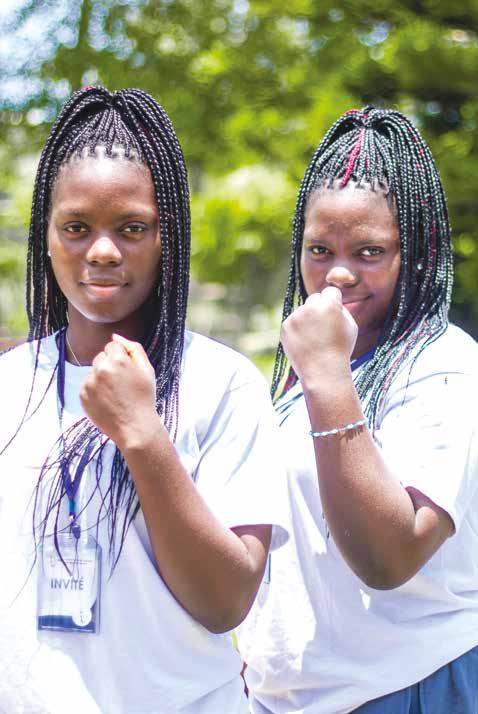
FORUM FOR AFRICAN WOMEN EDUCATIONALISTS (FAWE) | 2024 - 2028 Strategic Plan| 7
FAWE’s has demonstrated best educational practices through effective models and encouraged the adoption of these models by governments and educational institutions.

Gender Responsive Pedagogy (GRP): Successfully implemented in 24 SSA countries enhancing girls’ performance and retention in education.
Mothers’ clubs: Enables women to advocate at the grassroots level, mobilize community support, and raise awareness on the socio-economic benefits of girls’ education. 1 2 3 4 5 6 7
Technical Vocational and Education Training (TVET): To empower girls and women with a focus on skills development through TVET and entrepreneurial training.
Centers of Excellence (CoE): Aims to address challenges related to school physical environment, academic environment, and social environment.
Science Technology Engineering and Mathematics (STEM): Aims to promote mentorship of girls and women, encouragement of female learners and teachers to take up STEM subjects.
TUSEME ‘Let’s Speak Out.’: Enhances girls’ self-esteem, leadership skills, and promotes communities’ positive attitudes toward girls’ education.
School Related Gender Based Violence (SRGBV): Seeks to address SRGBV in a holistic and integrated manner, to get schools and communities to identify SRGBV, design tailored strategies to prevent and respond to SRGBV.
8 | FORUM FOR AFRICAN WOMEN EDUCATIONALISTS (FAWE) | 2024 - 2028 Strategic Plan
FAWE Demonstrative Models
[Courtesy: FAWE Uganda]

Scholarships
46,000
Comprehensive Scholarship Programme: Implemented across over 30 African countries since 2003, supported over 46,000 disadvantaged students.
Commonwealth Scholarships: FAWE has helped secure postgraduate scholarships in the UK for students in various African nations.




Mastercard Foundation Scholars Program: Since 2013, this program has provided comprehensive high school scholarship to 600 girls and 200 boys in Ethiopia. In Rwanda, 1,200 female scholars were supported through high school and 838 were supported for university.
334
In Uganda, through the Higher Education Access Program initiated in 2016 in partnership with Mastercard Foundation 334 scholarships were provided for 128 male and 206 female students.
FORUM FOR AFRICAN WOMEN EDUCATIONALISTS (FAWE) | 2024 - 2028 Strategic Plan| 9
[Courtesy: FAWE Rwanda]
National Chapters. Growing number NCs, currently 34.
A network of members in SSA with a significant footprint.
Partnerships.
• Global Affairs Canada in promoting Sexual Reproductive Rights of Girls in Ghana and Uganda
• Ford Foundation on ending teenage pregnancies in Kenya.
• Oxfam Kenya on promoting women participation in politics in Kenya.
• French Embassy Senegal on promoting quality education for girls in Burkina Faso, Gabon, and Senegal
• Sexual Violence Research Initiative (SVRI), research on sexual violence
• MasterCard Foundation (Scholars, Higher Education Access, and Imarisha Msichana Program)
Spread across sub- Saharan Africa in Anglophone, Francophone, and Lusophone countries.
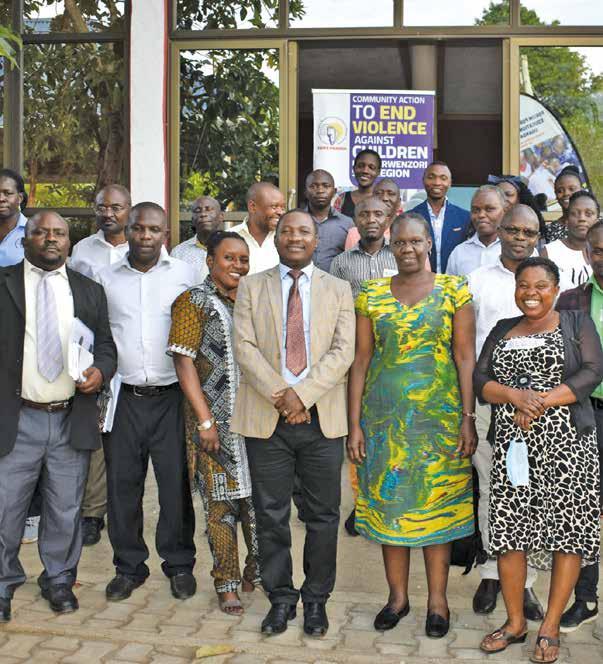

10 | FORUM FOR AFRICAN WOMEN EDUCATIONALISTS (FAWE) | 2024 - 2028 Strategic Plan
34
[Courtesy: FAWE Uganda]

Category of Stakeholders
Policy Makers/ Influencers
2.3 Who We Work With: Stakeholders and Partners
FAWE engages with a diverse stakeholders and partners who play crucial roles in working towards gender equality, girls’ education, and women’s empowerment in Africa. These stakeholders form a collaborative network that works together with FAWE to transform education systems, advocate for gender equality, and create educational opportunities for girls and women in Africa. FAWE’s engagement with these stakeholders is crucial for driving meaningful change and achieving its mission.
Primary stakeholders
Ministry of Education, Youth, Gender, Health, Child Protection, Finance and Labour
Parliaments
Local Governments
Alumni Networks
National Chapters
Civil Society Organisations
Non-Governmental Organisations
Partners
Implementers
Beneficiaries
Faith Based Organisations
Private Sector
FAWE National Chapters
FAWE RS
Teachers Unions
School Boards & Parents and Teachers Association
Teachers
Parents
Schools
Students
Girls & Women
Communities (including Boys & Men)
FORUM FOR AFRICAN WOMEN EDUCATIONALISTS (FAWE) | 2024 - 2028 Strategic Plan| 11



12 | FORUM FOR AFRICAN WOMEN EDUCATIONALISTS (FAWE) | 2024 - 2028
Strategic Plan
[ Courtesy: FAWE Zanzibar]
[Courtesy: FAWE Rwanda]
[Courtesy: FAWE Rwanda]
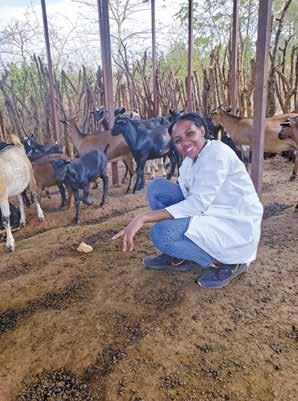
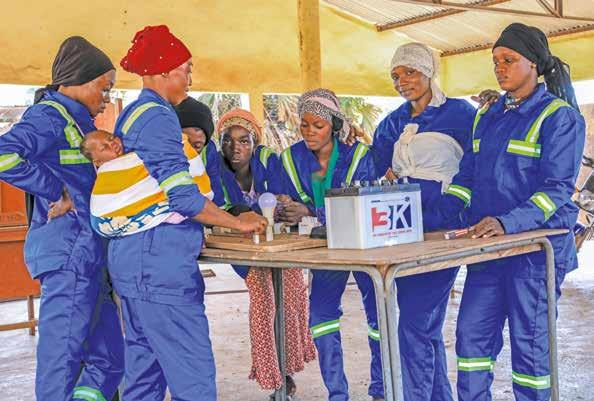


FORUM FOR AFRICAN
EDUCATIONALISTS
| 2024 - 2028 Strategic Plan| 13
WOMEN
(FAWE)
[Courtesy: FAWE Mali]
[Courtesy: FAWE Rwanda]
[Courtesy: FAWE Rwanda]
[ Courtesy: FAWE Mali]
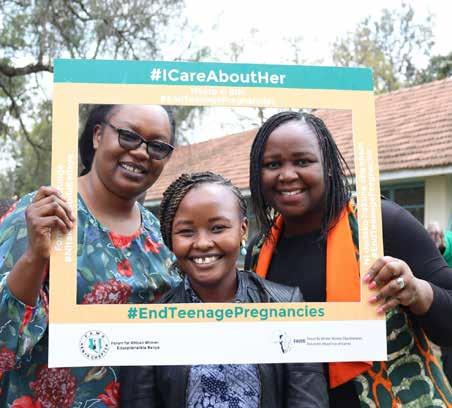
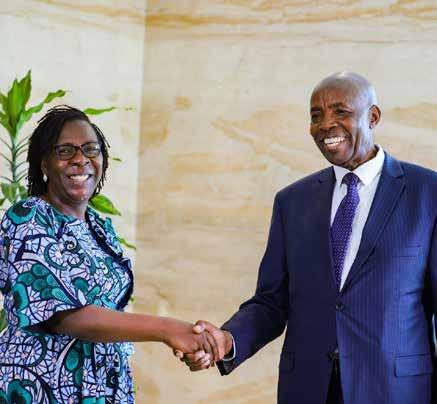
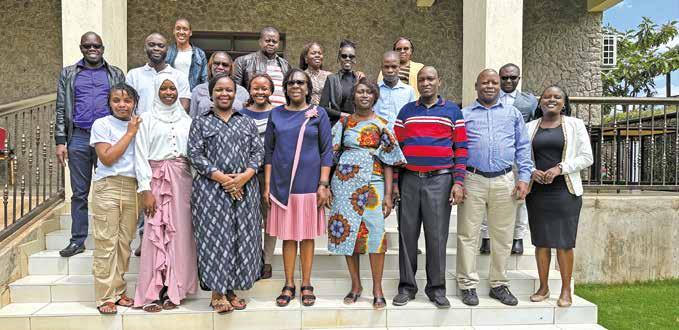

14 |
FORUM FOR AFRICAN WOMEN EDUCATIONALISTS (FAWE) | 2024 - 2028 Strategic Plan
[Courtesy: FAWE RS]
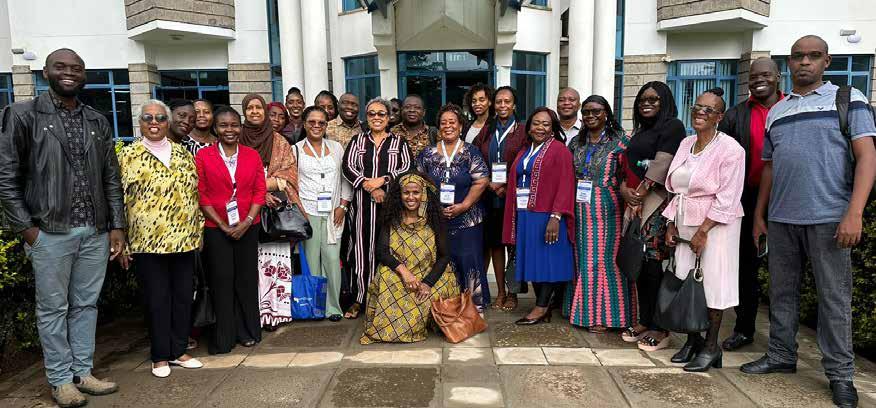
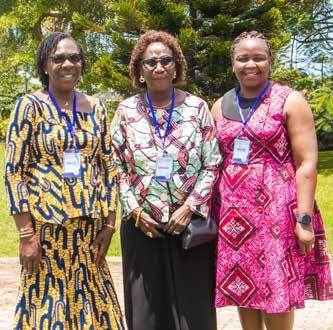

FORUM FOR AFRICAN WOMEN EDUCATIONALISTS (FAWE) | 2024 - 2028 Strategic Plan| 15
 [Courtesy: FAWE Zanzibar]
[Courtesy: FAWE Zanzibar]
How we work: Our approach
3.1 Key Elements of Our Approach
FAWE follows a comprehensive and holistic approach to promoting gender equality, girls’ education, and women’s empowerment in Africa. The key elements of FAWE’s approach are deliberately
designed and appropriate to influence policy reform and positive change in the community where FAWE works in partnership with other stakeholders.
Partnerships and Strengthening Networks: We actively work to build and strengthen networks, fostering collaboration, knowledge sharing, and mentorship.
Evidence-based Advocacy: We are committed and conscientious in making decisions based on current best evidence. We passionately advocate for changes to address structural barriers and policy reforms to reduce gender disparities in access, retention, and educational performance for girls and women.
Community Engagement: We endeavor to collaboratively cocreate solutions with communities of practice, drawing on their experience to influence education outcomes for girls and women.
Private Sector Engagement: We work more strategically and systematically with the private enterprise, applying private sector ethos and principles to catalyze investments toward realizing girls’ and women’s education.
FORUM FOR AFRICAN WOMEN EDUCATIONALISTS (FAWE) | 2024 - 2028 Strategic Plan| 17
3
The Context
4.1 Overview
The context analysis highlights the key education indicators, the underlying socio-economic issues, and the prospects and opportunities to tap into. The analysis also identifies factors that pose risks to FAWE’s efforts in making meaningful contribution towards advancing quality education for girls and women. These insights combined with a clear understanding of the external environment and internal capabilities have guided FAWE’s strategic decisions and actions contained in this strategic plan.
4.2 Key Education Indicators
Enrolment, Retention & Transition
The gross tertiary education enrollment ratio in SSA is 9.4%, way below the global average of 40%.–UNESCO UIS (2018) 12 million
Globally, the out-of-school population fell by just 9 million, while it increased in sub-Saharan Africa (SSA) by 12 million in 2022. - UIS, GEM Report
By 2022, the female out-ofschool rate was 4.2% higher than the male rate.2 As of 2019, 52 million girls were not in school in SSA, 4 million will never go back to school compared to 2 million boys.
Girls face early disadvantages in education, with 23% out of primary school compared to 19% of boys. - UNESCO
Source: UIS, GEM Report, 2022.
18 | FORUM FOR AFRICAN WOMEN EDUCATIONALISTS (FAWE) | 2024 - 2028 Strategic Plan
Out-of-school number and rate by age group, sub-Saharan Africa, 2000-2021 a. Number Out-of-school rate (%) Out-of-school population (million) 0 2000 2000 2005 2005 2010 2010 2015 2015 2020 2020 20 33 48 49 33 0 10 10 20 20 30 30 40 40 50 50 60 60 39 25 23 Upper secondary Lower secondary Primary 36 34 28 b. Rate
52 million 4.2% 9.4% 23% 19% 4
Primary School completion rate in SSA
Primary completion rate in sub-Saharan Africa, by sex, 1975-2020 (percentage)
Status of SDGs
SDG 4: Quality Education
67% of children in SSA complete primary school by age 15, among those who do, 30% achieve the minimum proficiency level in reading.
Source: World Bank and UNESCO Institute for statistics, 2022
In SSA, around 40 million more young individuals will discontinue their education between 2015 and 2025.1
SDG 5: Gender Equality
9.4%
The primary level completion rate in SSA stood at 70.3% in 2022, with 68.8% girls and 71.9% boys.10
SSA 9.4% of students transition to tertiary level, significantly lower than the global average of 38%. 84-88
Globally, young women in secondary education increased from 102 to 105 per 100 young men, achieving gender parity. In SSA, the ratio improved from 84 to 88, but it remains the region with the largest disadvantage for young women.
Less than 25% of African higher education students are in STEM fields, with most students studying social sciences and humanities.
40 million 70.3% 56%
The share of females graduating from tertiary education engineering fields is below 30% for many SSA countries.
COVID-19 and its Impacts on Girls’ and Women’s Education
Across SSA, there was an increase in the prevalence of adolescent pregnancies during COVID-19. Approximately 56% of adolescent girls dropped out of school due to pregnancy.
• In 2021, globally, 750 million women and girls were married before the age of 18 and at least 200 million women in SSA.
• In 2021, 1 in 4 women and girls aged 15-49 in SSA (24.7%) had undergone female genital mutilation, the practice is almost universal in Djibouti, Guinea and Somalia.
SDG 10: Reduced Inequalities
• By 2021, about 44 million women and girls had been forced to flee their homes due to climate change, war, conflict, and human rights violations.

FORUM FOR AFRICAN WOMEN EDUCATIONALISTS (FAWE) | 2024 - 2028 Strategic Plan| 19
Science, Technology, Engineering and Mathematics (STEM)
25% 30%
1975 1980 1985 1990 1995 2000 2005 2010 2015 2020 68.8 71.9 30 40 50 60 70 80 Girls Boys
4.3 Institutional Context – Gap Analysis
As FAWE, we have contributed to a remarkable impact over the last three decades. Our 2019-2023 strategic plan marked a turning point, intensifying our efforts to advocate for gender-responsive education policies, imparting skills in girls and women, and strengthening our institutional capacity. We also prioritized research
and knowledge management to pioneer innovative approaches for the girls’ education agenda in Africa. However, our work is not done. Recognizing the gaps in our efforts and the evolving challenges facing girls’ and women’s education in Africa, we have outlined a responsive strategic plan. 1 2 3 4
To strengthen our impact, we will enhance our capacity for evidence-informed advocacy. This entails bolstering our research capabilities and knowledge management, both at the Regional Secretariat and within our National Chapters. This will enable us to make evidence-informed decisions and advocate effectively for positive change.
We are set to revamp our advocacy efforts, focusing on advancing the adoption of gender-responsive policies in education to empower girls and women across Africa. Our aim is to ensure that educational systems prioritize and cater to the unique needs and aspirations of girls and women.
A crucial aspect of our strategic plan involves a comprehensive review and reinforcement of our internal governance, financial, and human resource procedures. By enhancing governance, accountability, and reporting mechanisms, we ensure that every aspect of our organization operates efficiently and transparently.

We have reflected over our values and guiding principles, aligning them with our renewed commitment to advancing the prosperity of girls and women in Africa. These values will guide our actions and decisions as we continue to work towards empowering and transforming the lives of girls and women on the continent.
20 | FORUM FOR AFRICAN WOMEN EDUCATIONALISTS (FAWE) | 2024 - 2028 Strategic Plan
Inclusivity
We promote equity in education, working to ensure equal access to quality education for all African girls and women, including those with disabilities regardless of their socio-economic background, geographical location, or cultural context.


Our Theory of Change 5
GOAL
An equitable and inclusive society where all African girls and women are thriving.
LONG TERM OUTCOMES
• Relevant skills and competencies for girls and women
• Improved employability
• Quality and well-paying jobs for girls and women
ENABLERS
Resource mobilization
Research
ICT
Effective governance
Strategic partnerships
INTERMEDIATE
Improved educational outcomes (enrolment, retention, literacy)
Improved access to quality education
OUTCOMES
Progressive mindset change
Gender responsive education policy
AGENTS OF CHANGE
• Ceased practice of HTPs Institutions
PATHWAYS OF CHANGE Capacity
Advocacy and policy influence
Poverty
Harmful traditional practices
Conflict and displacement
Gender inequality
Individuals Communities
ASSUMPTIONS
Government commitment
Communities willing to engage
Partners support
Political stability
FAWE institutional stability
22 | FORUM FOR AFRICAN WOMEN EDUCATIONALISTS (FAWE) | 2024 - 2028 Strategic Plan
INSTITUTIONAL BARRIERS
FOUNDATIONAL
Marginalization
Limited teacher capacity Limited infrastructure Inadequate resources Policy
gaps
strengthening Implementation of FAWE demonstrative models Community engagement and social change Research, knowledge, and learning

Strategic Framework
Our Vision
An equitable and inclusive society where all African girls and women are thriving.

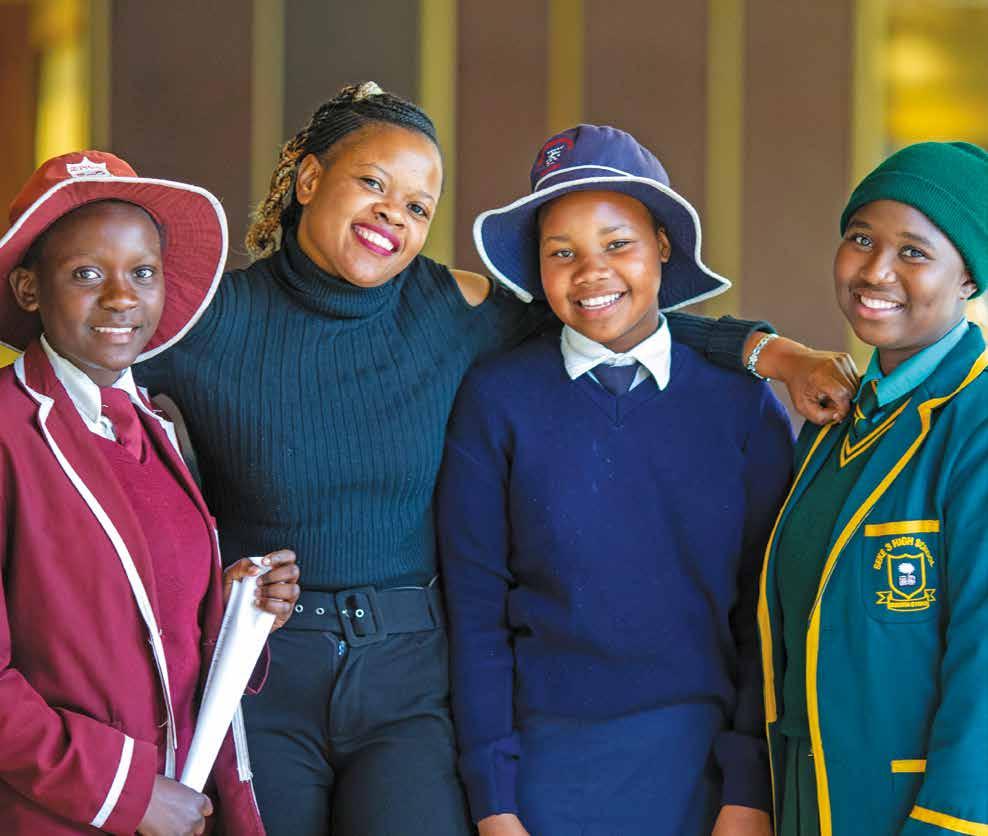
6
[Courtesy: FAWE Zimbabwe]
Our Mission
To promote gender responsive policies, practices, and attitudes in education to enhance equal opportunities for African girls and women.

[Courtesy: FAWE RS]
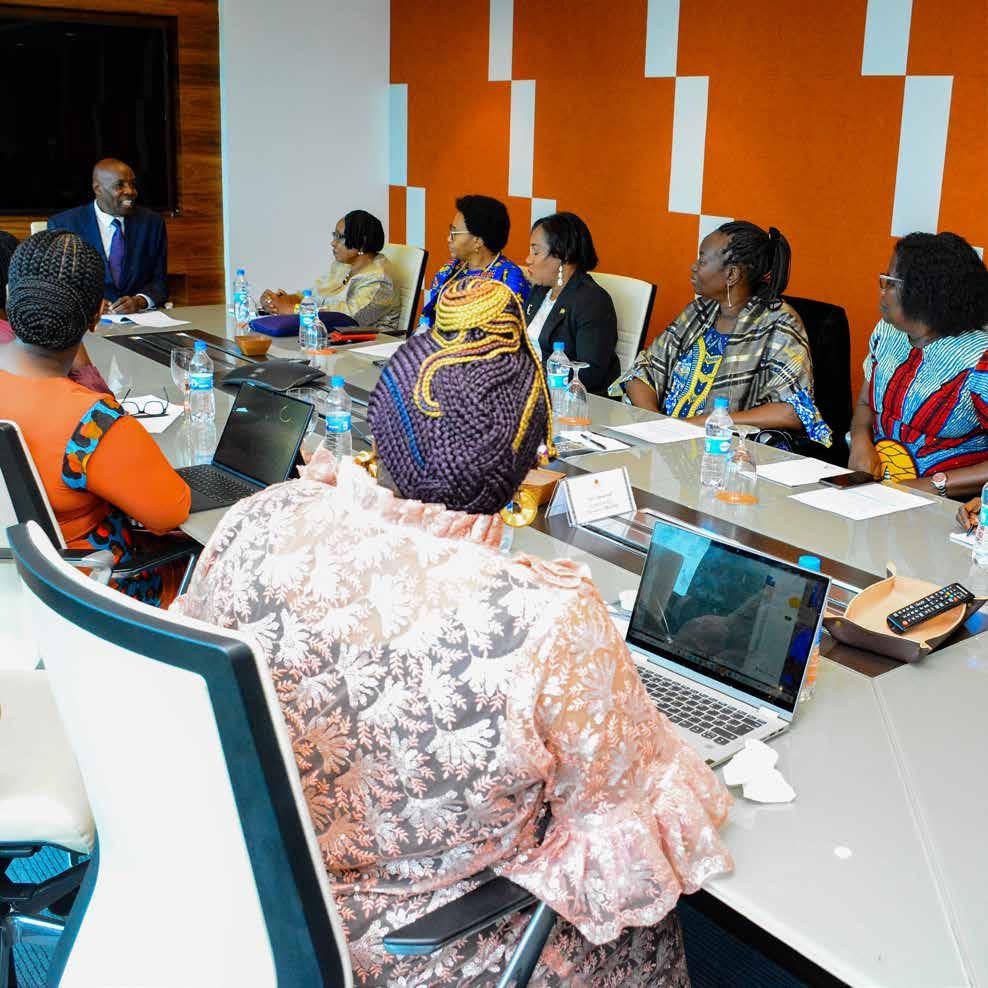
Our Motto Education for Change

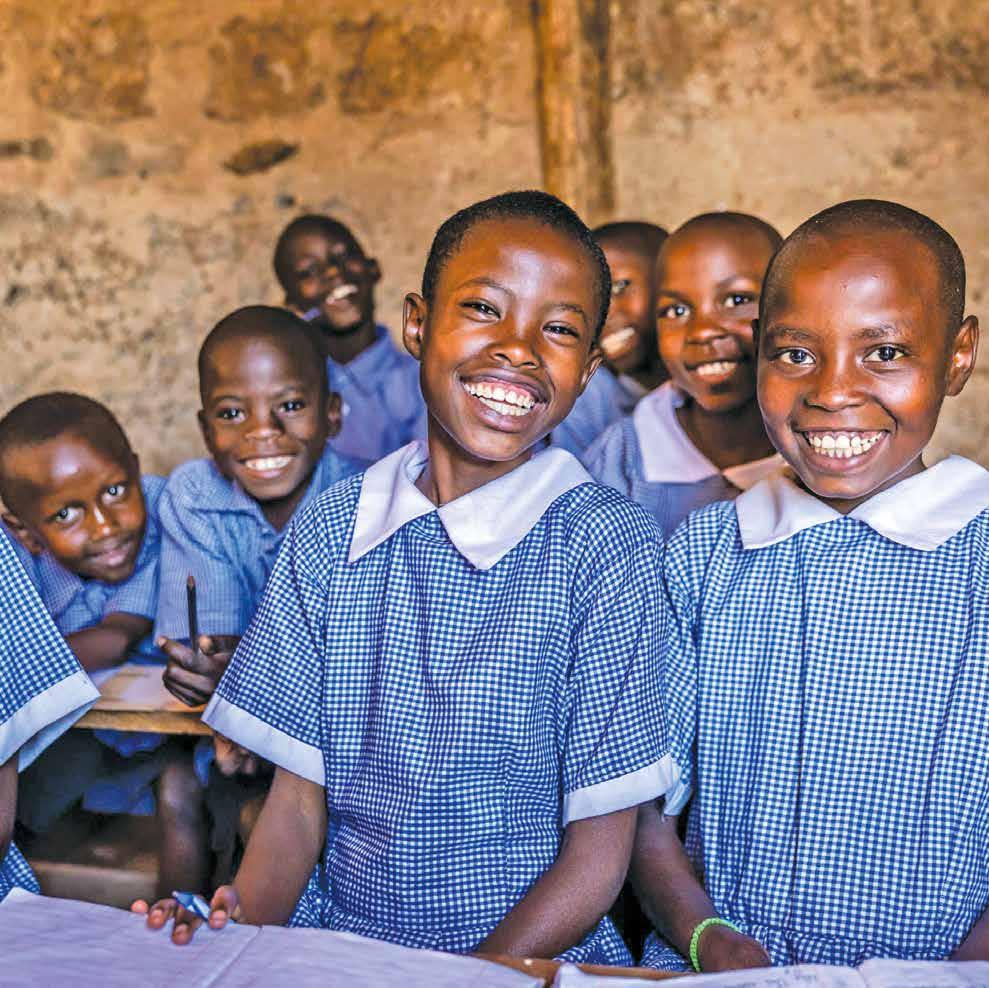
6.4 Values and Guiding Principles
At FAWE, our values and guiding principles form the bedrock of our work towards promoting gender equality, girls’ education, and women’s empowerment in Africa. These principles guide our actions and shape our decision-making process, ensuring that we stay true to our mission and vision. They define who we are and serve as a compass in our journey toward a more equitable and inclusive African society. Our 5 I’s are:
5 I’s
Impact-oriented: We prioritize and meaningful results and long-term outcomes for girls and women, educators, and the educational system with a focus on creating positive and lasting impact on individuals, communities, and society.
Inclusivity: We promote equity in education, working to ensure equal access to quality education for all African girls and women, including those with disabilities regardless of their socio-economic background, geographical location, or cultural context.
Innovation: We utilize creative solutions, research, and technology integration to overcome educational challenges faced by women and girls.
Involvement: We foster collaboration and partnerships with various stakeholders to create a collective impact in advancing girls’ and women’s education in Africa.
Integrity: We hold ourselves accountable to the highest standards of excellence, transparency, and responsible governance. We are transparent in our actions and utilization of resources efficiently, ensuring that our activities have a meaningful impact and deliver value to the communities we serve.
26 | FORUM FOR AFRICAN WOMEN EDUCATIONALISTS (FAWE) | 2024 - 2028 Strategic Plan
Innovation
We utilize creative solutions, research, and technology integration to overcome educational challenges faced by women and girls.


 [Courtesy: FAWE Mali]
[Courtesy: FAWE Uganda]
[Courtesy: FAWE Mali]
[Courtesy: FAWE Uganda]
6.5 Strategic Objectives
This strategic plan will pursue three strategic objectives over the next five years. The strategic objectives highlight the specific areas of work that FAWE has prioritized based on an institutional analysis, reflections on FAWE’s main objective, and an extensive context analysis. The emphasis for this strategic plan has not deviated significantly from the previous plan. However, a renewed focus on doing things differently while consolidating gains from the previous strategic plan period is prioritized. In this section, we elaborate on the three strategic objectives, the strategic interventions, and the anticipated outcomes. Detailed activities are attached as Annex 1: Key Activities & Performance Indicators.
6.5.1 Strategic Objective
STEM fields have fewer than 30% female graduates in many SSA countries.
Girls have a lower primary completion rate (68.8%) compared to boys (71.9%),
in adolescence, 36% of girls are excluded from education.
200 million 52 million
girls that are not attending school
girls that were married off before age 18, of women and girls aged 15-49 in SSA have undergone female genital mutilation (FGM)
I: To enhance provision and access to quality education and training opportunities for girls and women in Africa.
Overview:
Quality education involves delivering foundational and advanced skills in secure, inclusive settings with skilled teachers. UNESCO and UNICEF highlight two key indicators: cognitive development and emotional growth. Currently, 52 million girls are not attending school, in adolescence, 36% of girls are excluded from education. Girls have a lower primary completion rate (68.8%) compared to boys (71.9%), and STEM fields have fewer than 30% female graduates in many SSA countries. Furthermore, 200 million girls were married off before age 18, 24.7% of women and girls aged 1549 in SSA have undergone female genital mutilation (FGM). These issues, exacerbated by poverty and social norms, worsened by the COVID-19 pandemic require urgent action. We will intervene in several areas to enhance access to quality education.
28 | FORUM FOR AFRICAN WOMEN EDUCATIONALISTS (FAWE) | 2024 - 2028 Strategic Plan
30% 68.8% 24.7% 36%
Intervention Area Strategic Actions Outcomes
Access, retention, transition, and performance for girls and women
Acquisition of relevant skills for employment, decent jobs, and entrepreneurship
Advocate for increased financing for education by governments
Advocate for the implementation of policies to ensure inclusive and continuous education for women and girls.
Address harmful cultural norms and barriers to education for girls and women
Support governments in developing gender responsive TVET policies
Promote economic empowerment for girls and women
Promote participation of women and girls in STEM subjects
Equitable access to quality education and enhanced academic performance
Inclusion and enhanced safety in the education system
Advocate for the development and implementation of policies that prioritize inclusion and safety in education.
Advocate for and support the development of appropriate and accessible school infrastructure.
Empowerment through the education and skill development of girls and women
An inclusive and secure learning environment, for girls’ full participation and achievement in education
Mainstreaming of FAWE demonstrative models in country education systems
Education in emergencies
Scale up the implementation of FAWE demonstrative models within country education systems.
Development of new FAWE Demonstrative Models
Leverage eLearning to support roll out of FAWE demonstrative models
Advocate for child rights to education in emergencies
Support and collaborate on education in emergencies initiatives
Improvements in quality, equity, and inclusiveness in education.
Ensure the right to education for girls and women in a safe and supportive environment
FORUM FOR AFRICAN WOMEN EDUCATIONALISTS (FAWE) | 2024 - 2028 Strategic Plan| 29
6.5.2 Strategic Objective
2:
To enhance the generation and utilization of research evidence to inform education policy and practice.
Overview:
FAWE recognizes that investing in research generation and the use of up-to-date, relevant data in its advocacy work in education policy and practice is imperative. We believe utilizing research evidence to influence interventions targeting specific girls’ and women’s issues will ensure targeted and more impactful strategic actions. We will
continue to invest in research evidence generation that is aligned with our mission while aligning with global and regional development agenda. We will ensure that the interventions that target women are based on gender-sensitive research that is responsive to the needs of girls and women at all levels and in all settings in Africa.
Intervention Areas
Strategic Actions
Enhancing capacity for research
Enhancing capacity for knowledge management
Outcomes
Strengthen ability to generate, synthesize and use research evidence to address gender inequality in education.
Expand the knowledge management function of FAWE (capturing, organizing, evaluating, sharing, and retaining information assets)
Establish regional knowledge hub for evidence on girls’ education and empowerment of women.
Partnership and collaboration with research institutes, think tanks and universities
Improved research evidence generation and knowledge management across the FAWE network
Well-functioning research management system in place
Strengthen partnerships and collaboration for research
Partnerships and networks built to enhance research generation and use
30 | FORUM FOR AFRICAN WOMEN EDUCATIONALISTS (FAWE) | 2024 - 2028 Strategic Plan
6.5.3 Strategic Objective 3: To strengthen institutional capacity and enhance the operational effectiveness of the FAWE network.
Overview:
Organizational governance involves processes and structures for decision-making, accountability, controls, and behaviours designed to accomplish an organization’s objectives. It also encompasses establishing an organizational culture and identity to promote shared values. A strong governance system can enable an organization to achieve its objectives
more efficiently and effectively. This focus area is inward-looking and will mainly focus on reinforcing the internal organisational capacity of FAWE. It aims to build on existing organisational strengths while addressing emerging capacity gaps, to enable FAWE to implement interventions effectively and efficiently. It will focus on several strategic objectives that address priority areas in institutional strengthening at the Regional Secretariat and National Chapters.
Intervention Area Strategic Actions Outcomes
Resource mobilization and grants management
Governance and organizational structures
Strengthen network capacity for resource mobilisation
Enhance staff capacity in utilization of grants management framework
Enforce appropriate internal controls, oversight, and compliance mechanisms.
Reorient FAWE network on objectives, goals, and identity.
Optimize utilization of finance, human resource and administration system
Increased funding for the FAWE RS and National Chapters.
A robust governance system enabling the achievement of objectives more efficiently and effectively.
Programming capacity
Strengthen the technical capacity of FAWE RS and NCs in program cycle management.
Enhance monitoring, evaluation and learning.
Socialize NCs on the 2024-2028 SP
Communication and visibility
Develop and operationalize a communication strategy and plan.
Rebranding of FAWE
Sustained digital media presence and campaigns.
Improved adaptive programming and results-driven implementation.
Increased recognition of Brand FAWE and shared identity among National Chapters.
Partnership and collaboration
Enhance alumni involvement
Forge strategic alliances
Creation of a robust network and support system
FORUM FOR AFRICAN WOMEN EDUCATIONALISTS (FAWE) | 2024 - 2028 Strategic Plan| 31
Integrity
We hold ourselves accountable to the highest standards of excellence, transparency, and responsible governance.

[Courtesy: FAWE RS]
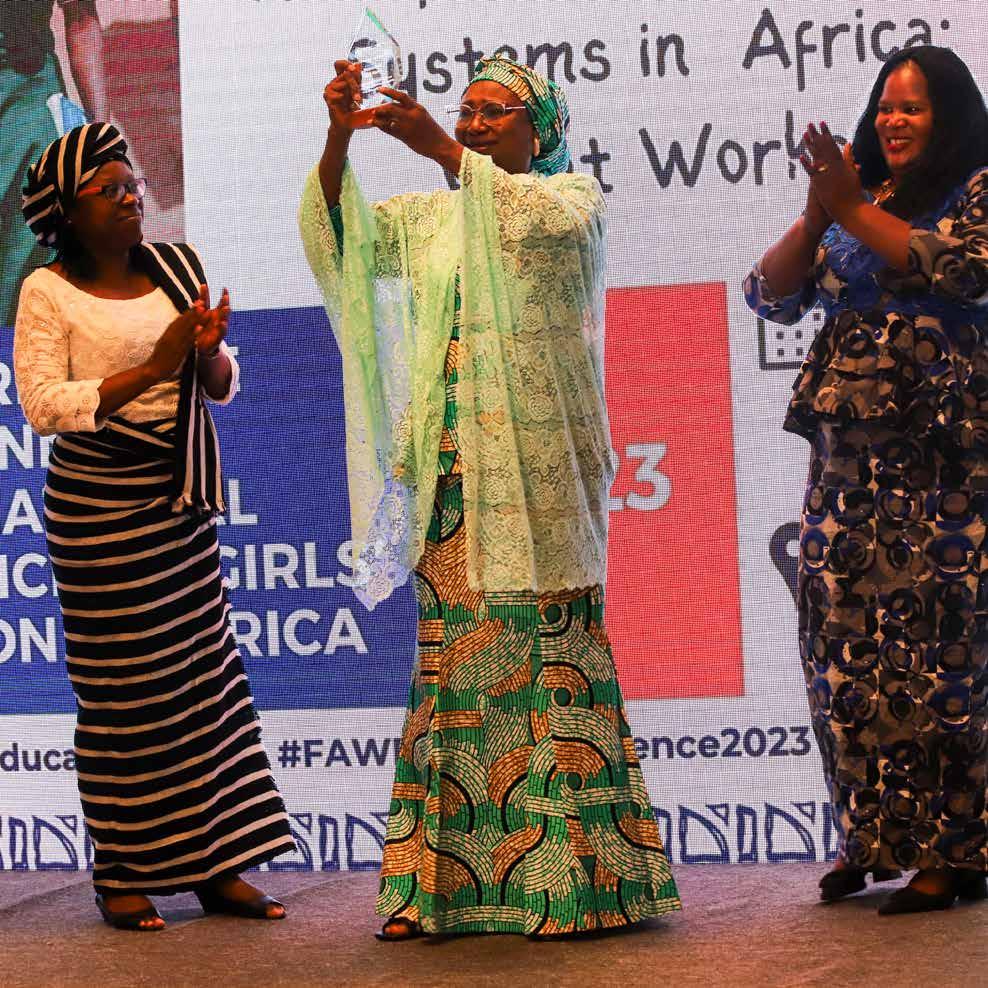
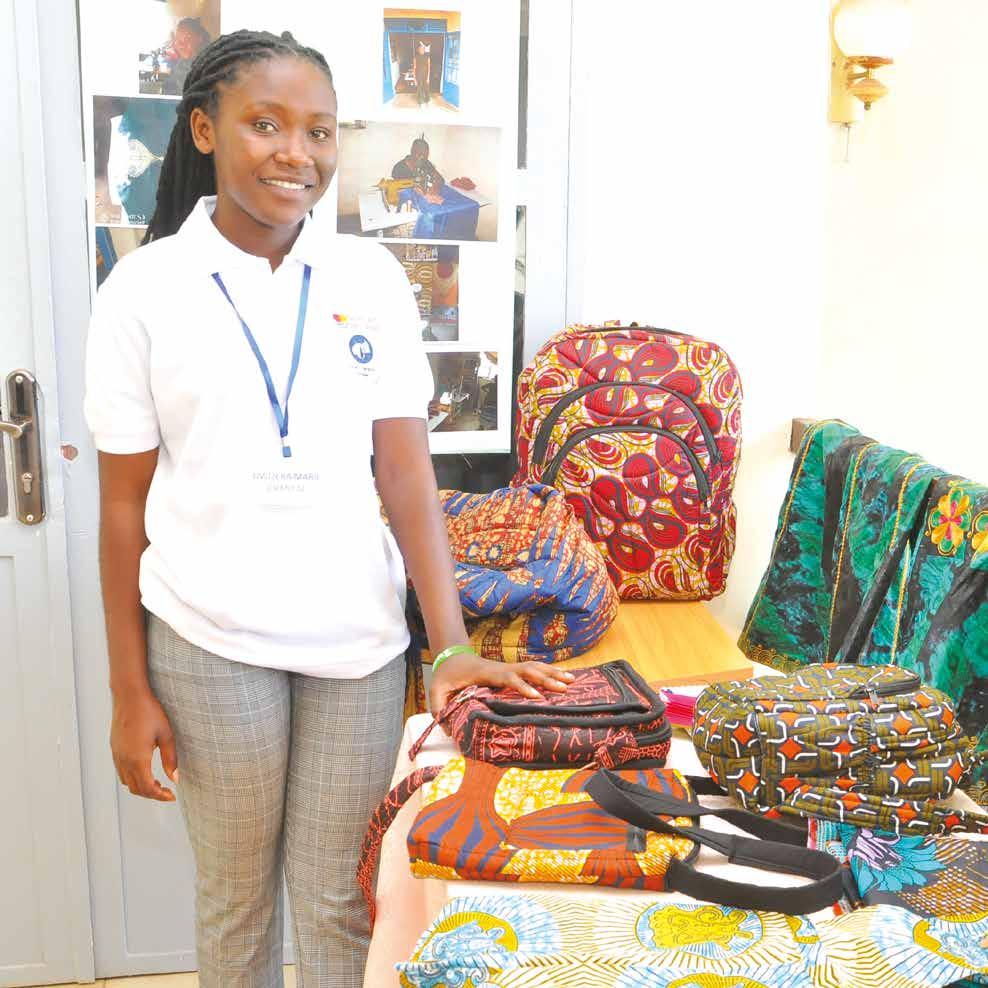 [Courtesy: FAWE Rwanda]
[Courtesy: FAWE Rwanda]
Implementation and coordination
7.1 Financial Resource Needs
The estimated budget for the implementation of this strategic plan is USD 57,868,481. FAWE’s programmatic focus (SO 1 and SO 2) is projected to utilize over 75% of the budget, with the rest going to SO 3, whose focus is institutional strengthening and capacity to enhance the operational effectiveness of the FAWE network.
to quality education and training opportunities for girls and women in Africa.
of research evidence to inform education policy and practice.
34 | FORUM FOR AFRICAN WOMEN EDUCATIONALISTS (FAWE) | 2024 - 2028 Strategic Plan
Year Strategic Objective (SO) 2024 (USD) 2025 (USD) 2026 (USD) 2027 (USD) 2028 (USD) TOTAL (USD) SO 1: To enhance
8,171,559 8,239,512 8,372,407 8,958,476 9,764,739 43,506,693 SO 2: To enhance
utilization
430,082 620,178 930,267 995,386 1,084,971 4,060,885 SO 3: To strengthen institutional capacity and enhance the operational effectiveness of the
network. 1,965,912 2,024,830 2,064,108 2,103,387 2,142,666 10,300,903 Total 10,567,553 10,884,520 11,366,783 12,057,249 12,992,375 57,868,481 7
provision and access
generation and
FAWE
7.2 Resource Mobilization
Successful implementation of FAWE’s 2024-2028 strategic plan will not only depend on the commitment of the stakeholders, but also on the availability and efficient utilization of resources required to undertake the planned activities. This strategic plan will be supplemented by a resource mobilization strategy establishing the framework for delivering increased, stable, and sustainable funding to achieve FAWE’s ambitious agenda.
7.3 Implementation of the Strategic Plan
The strategic plan will be implemented at the National Chapter and the Regional Secretariat level. To facilitate the implementation at the country level, FAWE National Chapters will update or align their strategic plans to the FAWE Africa strategy and develop corresponding work plans and budgets. On an annual basis, FAWE will develop work plans and budgets that are premised on the strategic plan. FAWE will also develop or participate in programmes or projects that translate the strategic plan into action. These programmes will run for various periods over the tenure of the strategic plan.
7.4 Governance and Management
This section presents FAWE’s governance and management arrangements that will facilitate the implementation of the strategic plan.
7.4.1 FAWE Africa Board
FAWE is governed by an eleven-member FAWE Africa Board that provides overall policy guidance and direction to FAWE. The Board’s membership is drawn from various sub-regions of sub-Saharan Africa that meet twice a year. To provide policy guidance and direction, the Board approves FAWE’s work programmes and budgets. The Board admits new members into FAWE, who the General Assembly ratifies. The Board approves the creation of regional and national offices and any other representations, including


recognition of National Chapters, appoints the Executive Director, and approves the appointment of senior officers at the Secretariat. Besides overseeing the management of FAWE assets and overall corporate governance, the board represents and speaks on behalf of FAWE at international fora.
7.4.2 Regional Secretariat
The Regional Secretariat is managed by an Executive Director, who reports to the FAWE Africa Board. The Executive Director oversees the day-to-
FORUM FOR AFRICAN WOMEN EDUCATIONALISTS (FAWE) | 2024 - 2028 Strategic Plan| 35
[Courtesy: FAWE Malawi]
[Courtesy: FAWE Rwanda]

day operations of the Secretariat. The Regional Secretariat will work closely with the National Chapters to implement the strategic plan. The Regional Secretariat in Nairobi, Kenya, provides coordination and technical support to National Chapters and monitors and evaluates the entire organization’s work. Specifically, it prepares, implements, and monitors detailed work programmes of the organization, and provides communication liaison with individual members, funding partners, and strategic partners. The Regional Secretariat also supports the functions of the FAWE Africa Board and the General Assembly by preparing background documentation and maintaining proper books of accounts and audited reports for the smooth running of the organization. The FAWE Africa Board and Regional Secretariat Organogram is attached below.
7.4.3 National Chapters
The National Chapters are governed by National Boards elected by National Assemblies which hold their meetings once every year. The National Assemblies bring together all members and representatives of alumni. Such assemblies are chaired by Chairpersons of National Boards, their deputies or designated members and technically supported by National Secretariats. The structure, composition, and roles of different officers of National Secretariats are determined by National Boards. A National Coordinator heads the chapter secretariat. The National Chapters implement FAWE programmes and interventions at the country level, working directly with Ministries of Education (MoE), strategic partners, and communities to ensure that programmes are effectively implemented and fully supported by all stakeholders.
36 | FORUM FOR AFRICAN WOMEN EDUCATIONALISTS (FAWE) | 2024 - 2028 Strategic Plan
7.4.4 FAWE Africa Alumni Network
The FAWE Alumni Network is an association of African young women and men who have benefited from FAWE’s interventions at regional or national chapter level. Through the alumni association, FAWE harnesses the intellectual and technical resource and energies of these young women and young men and utilizes it to foster positive change to the social, cultural, and economic context in which girls’ education is provided in Africa and inspire schoolgirls and boys to remain focused on education.
Membership to FAWE alumni associations is not limited to graduates of FAWE Centres of Excellence or of scholarship programmes but is open to any graduate who was a student in a school or training institution where FAWE implemented an intervention that they may have directly or indirectly benefited from. The members voluntarily come together
to form local/sub-national, national, and regional associations. Every FAWE Alumni Network exists under the auspices of the FAWE National Chapter to which it is affiliated and draws its legitimacy. The FAWE Alumni Network offers every alumnus the opportunity to stay involved with and connected to the FAWE Chapter and fellow alumni. In each country, the alumni network is organized into forums at national and sub-national level. The FAWE Africa Alumni Network is constituted by members representing each national alumni forum. Each National Alumni Forum elects and submits three (3) members to represent them on the FAWE Africa Alumni forum. At FAWE Africa level, members from the various National Alumni forums elect a seven (7) member Regional Executive Committee to execute regional level activities. Elections are held after every three years.

FORUM FOR AFRICAN WOMEN EDUCATIONALISTS (FAWE) | 2024 - 2028 Strategic Plan| 37
[Courtesy: FAWE RS]
 [Courtesy: FAWE Zimbabwe]
[Courtesy: FAWE Zimbabwe]
FAWE AFRICA & REGIONAL SECRETARIAT ORGANOGRAM
Africa General Assembly
FAWE Africa Board Executive Director
Finance and Administrative Director (FAD) Senior Finance Officer Senior Human Resource Officer Senior Advocacy & Partnership Officer
ICT Officer
IT Assistant Procurement Officer
Advocacy Officer ED Executive Assistant Finance Officer(s) Finance Officer WASRO
Assistant Finance Officer Nairobi Assistant Finance Officer WASRO
Administrative Assistant Office Assistant
Deputy Executive Director/Head of Programs ( DED )
Regional Coordinator WASRO
Programmes Officer (s)
Senior Knowledge Management Officer
Knowlegde Management Officer (s)
Senior Communication Officer Senior Business Development Officer Business Development Officer
Knowlegde Management Officer (s) WASRO Communication Officer Business Development Officer
Assistant Program Officer(s) Research Officer(s)
Assistant Programme Officer Communication Officer WASRO
Senior Programme Officer(s) Programme Officer(s)
Assistant Programme Officer (s)
FORUM FOR AFRICAN WOMEN EDUCATIONALISTS (FAWE) | 2024 - 2028 Strategic Plan| 39
40 | FORUM FOR AFRICAN WOMEN EDUCATIONALISTS (FAWE) | 2024 - 2028 Strategic Plan
NATIONAL CHAPTER ORGANOGRAM
National Chapter General Assembly
National Chapter Board
National Coordinator
NB: National Chapters Organograms vary.
Programmes Unit
Knowlegde Management Unit
Finance and Administrative Unit
Advocacy & Partnership Unit Communication Unit
Resource Mobilization Officer
Monitoring, Evaluation, Reporting and Learning 8

8.1 Overview
For FAWE, the overall goal of monitoring, evaluation, reporting, and learning (MERL) is to track and demonstrate realization of results from the implementation of this strategic plan. The MERL framework’s main purpose is four-fold and includes to:
• Enhance monitoring and evaluation (M&E) to derive results, lessons, and best practice from evidence.
• Strengthen FAWE’s capacity in evidence-informed programming, M&E, and knowledge management.
• Ensure that knowledge generated by FAWE and its partners in advocacy, programme implementation and lessons learnt is deliberately captured, curated, and disseminated widely.
• Promote greater transparency and accountability, through the generation of sound information.
8.2 Monitoring
Monitoring the strategy implementation will involve the following:
• Analysis and Reporting – Information and data obtained on progress of implementation will be obtained from National Chapters and Regional Secretariat reports, analysed, and documented on a quarterly and annual basis.
• Validation – This will involve checking or verifying whether reported progress is accurate or not through field visits, partner feedback or surveys.
• Indicator Performance Tracking – Achievement of quantitative indicators outlined in the results framework will be tracked in a database and disaggregated based on gender and special interest groups (e.g., persons with disability or youth) where applicable. Periodic summaries will be generated for reporting as well as for assessing the rate of indicator achievement, based on milestones and measurable outputs.
A MERL Committee comprising of the Executive Director, Head of Programmes, Heads of Units and Programme Officers will oversee the implementation of the strategic plan. The MERL Committee will hold quarterly meetings to review the status of strategic plan implementation as it relates to their respective areas. The committee will report annually to the FAWE Africa Board on the progress of the strategic plan implementation.
• Stakeholder Participation – FAWE RS will obtain feedback from the NCs, partners and beneficiaries on progress and proposed actions through quarterly stakeholder consultations. This will provide avenues for discussions on emerging issues during the strategy implementation period. Feedback from stakeholders will be used to examine outcomes and course-correction where necessary.
FORUM FOR AFRICAN WOMEN EDUCATIONALISTS (FAWE) | 2024 - 2028 Strategic Plan| 41

8.3 Evaluation
FAWE will conduct annual performance reviews, midterm review and end term review of this strategic plan.
• Annual performance reviews – Annual reviews of the strategic plan will be conducted to ensure that required changes to strategies and key activities are evidenced-informed by information from the quarterly reviews and continuous monitoring. The findings from the annual reviews will be shared with stakeholders as appropriate. Lessons from the annual reviews will be used to inform periodic reviews in program design and strategies.
• Mid-term review – An independent mid-term review of the strategic plan will be undertaken to identify progress made in implementing the strategy and in the contribution to the achievement of the overall goal, challenges affecting implementation as well as lessons learnt. The findings of the mid-term review will provide
critical recommendations for the remaining half of the strategic plan. The MERL committee will be responsible for overseeing the implementation of actionable recommendations from the validated mid-term review report.
• End-term review – The end-term review will be conducted at least six months before the end of the strategic plan period in 2028. The review will assess the impact of FAWE’s work through the implementation of the strategy. The review will also examine sustainability, constraints, lessons learnt, mitigation measures and provide recommendations for the next strategy.
8.4 Reporting
Reporting on the strategy implementation will be two-fold.
• Quarterly reporting – Every quarter (once every 3 months), FAWE will document progress towards implementation of the strategy, the achievement of results, challenges and lessons learnt.
42 | FORUM FOR AFRICAN WOMEN EDUCATIONALISTS (FAWE) | 2024 - 2028 Strategic Plan
[Courtesy: FAWE Uganda]
 [Courtesy: FAWE Uganda]
[Courtesy: FAWE Uganda]
• Annual reporting – Every end of year, FAWE will develop an annual report documenting results. The report will also document lessons learnt and how they have been applied to inform programming. Annual reports will be disseminated to all stakeholders through appropriate forums.
8.5 Learning
FAWE is a highly recognized institution in the areas of education and gender. Over the period of this strategic plan, FAWE plans to harness this by ensuring that research products and lessons learnt from its work and that of National Chapters and its partners is documented and made accessible to all stakeholders to influence policy and action at national and regional levels. Opportunities for learning and reflection will be provided through various channels.
• Stakeholder forums – These forums will be held annually to review progress, share lessons learnt and document results. Key stakeholder groups will include National Chapters, development and implementing partners.
• Annual reflective workshops – periodic forums for the Regional Secretariat and National Chapters will be organized to reflect on emerging issues during strategy implementation. These forums will provide opportunities for collaborative learning and adaptation of programmes and interventions to enhance achievement of FAWE’s goal.
• Pause and reflect sessions – FAWE will organize and facilitate a series of pause and reflect sessions with National Chapters and decision-makers to generate lessons and make recommendations about partnerships and generate recommendations about joint work.
FORUM FOR AFRICAN WOMEN EDUCATIONALISTS (FAWE) | 2024 - 2028 Strategic Plan| 43
Involvement
We foster collaboration and partnerships with various stakeholders to create a collective impact in advancing girls’ and women’s education in Africa.


Annexes
Annex 1: Key Activities & Performance Indicators
Strategic Objective
SO1: To enhance provision and access to quality education and training opportunities for girls and women in Africa.
Strategic Action Activities
Advocate for increased financing for education by governments
Advocate for the implementation of policies to ensure inclusive and continuous education for girls and women.
Conduct research and policy analysis that identifies gaps in education funding
Hold policy dialogue forums on education financing with policy makers and education officials
NCs join local education groups (LEGs) to raise profile on increased education financing
Participate in technical working groups for education budgeting and tracking
Support the participation of community members in budget making process
Training for NCs on gender-sensitive policy mainstreaming
Support NCs to engage governments in developing gender sensitive policies in education
Sensitization of policy makers and education officials on gender sensitive policies
Provide comprehensive scholarships packages for economically disadvantaged students
Performance Indicators
Study commissioned and findings disseminated
Number of policy dialogue forums held in NCs
Number of LEGs meetings attended in-country
Number of technical working groups attended
Issues presented by community members in budget making process
Number of trainings conducted on gender sensitive policy mainstreaming
Number of policies reviewed/ developed
Issues raised leading to policy review or implementation
Number of disadvantaged students provided with comprehensive scholarships
Address harmful cultural norms and barriers to education for girls and women
Conduct research on best practices to engage communities on harmful cultural norms on girls’ and women education
Facilitate NCs to conduct community sensitization forums on child marriage, FGM, teenage pregnancy
Study commissioned and findings disseminated
Proportion of communities committing to address harmful cultural practices
FORUM FOR AFRICAN WOMEN EDUCATIONALISTS (FAWE) | 2024 - 2028 Strategic Plan| 45
Support governments in developing gender responsive TVET policies
Support the formation and strengthening of community action groups
Conduct youth led community outreach programs on SRH
Conduct employment skills gaps analysis
Provide technical assistance for gender sensitization of TVET curriculum
Training of TVET facilitators and government officials on GRP
Popularize TVET initiatives for girls and women
Provide TVET scholarships for girls and women
Promote economic empowerment for girls and women
Advocate for the development and implementation of policies that prioritize inclusion and safety in education.
Partner with local enterprises for apprenticeships for girls and women
Provide access to financial resources, and guidance in business development
Facilitate networking and establishment of women led business groups
Conduct comprehensive policy analysis on inequality and safety in schools
Facilitate governments to develop safety framework in schools
Facilitate inclusive and safety-focused dialogue forums
Advocate for and support the development of appropriate and accessible school infrastructure.
Convene meetings with education officials and partners to create awareness and importance of inclusive and appropriate school infrastructure
Hold community meetings to raise awareness on inclusive and appropriate school infrastructure
Number of youth-led outreach programs conducted
Scale up the implementation of FAWE demonstrative models within country education systems
Number of action groups formed or strengthened, and issues addressed
Study commissioned and findings disseminated
Number of TVET curriculum reviewed
Number of trainings conducted and appreciation of GRP
Number of initiatives for popularization conducted
Number of scholarship recipients completing studies
Number of MOUs signed with local enterprises and girls and women enrolled for apprenticeships
Number of startups provided with financial and business support
Number of women led business groups established.
Study commissioned and findings disseminated
Number of safety frameworks developed/ reviewed
Number of safety dialogue forums conducted
Number of meetings with education officials and partners.
Number of community meetings held Conduct gender-sensitive assessments to identify the specific needs and vulnerabilities of girls, women, and children with disability
Conduct impact study on FAWE demonstrative models in enhancing women and girls’ education
Study commissioned and findings disseminated
Study commissioned and findings disseminated Strategic Objective Strategic Action Activities Performance Indicators
46 | FORUM FOR AFRICAN WOMEN EDUCATIONALISTS (FAWE) | 2024 - 2028 Strategic Plan
SO2: To enhance generation and utilization of research evidence to inform education policy and practice.
Development of new FAWE Demonstrative Models
Leverage eLearning to support roll out of FAWE demonstrative models
Convene forums for dialogue on mainstreaming of FAWE demonstrative models at national level
Facilitate trainings for education officials, teachers, and students on demonstrative models
Conduct needs assessment
Advocate for child rights to education in emergencies
Support and collaborate on education in emergencies initiatives
Strengthen ability to generate, synthesize and use research evidence for advocacy in favor of girls and women
Performance Indicators
Number of governments committing to mainstreaming of the demonstrative models
Number of trainings conducted for education officials, teachers, and students.
Assessment conducted. Develop demonstrative models
Number of new models developed Pilot new demonstrative models
Blend technology-based teaching strategies on FAWE demonstrative models.
Conduct training to teachers and students to achieve adoption of eLearning.
Purchase equipment for demonstrating integration of eLearning to FAWE demonstrative models
Advocate for the endorsement of the Safe Schools Declaration by all African States and Territories
Advocate for policies that support education in emergencies
Equip teachers with skills, knowledge, and attitudes to be effective facilitators through continuous teacher professional development
Work with partners to develop an emergency sensitive learning curriculum
Number of new models piloted
Number of FAWE demonstrative models blended with technology
Number of trainings conducted for teachers and students.
Number of demonstration workshops carried out.
Number of African states and territories that ratify and endorse the declaration
Knowledge management strategy developed Strategic Objective
Expand the knowledge management function of FAWE (capturing, organizing, evaluating, sharing, and retaining information assets)
Number of policies developed that support education in emergencies
Number of teachers trained on provision of education in emergencies
Context specific crisis sensitive curricular developed
Develop a comprehensive research strategy Research strategy developed Training of FAWE staff at RS and NCs to enhance knowledge and skills in conducting research.
Collaboration with policy research think tanks to improve staff capacity to undertake research.
Undertake joint initiatives to promote learning and adaptation across FAWE network
Recruit qualified staff for the research department
Develop knowledge management strategy (process, tool, plan)
Number of staff trained on research
Number of joint policy research conducted
Number of joint learning initiatives across FAWE network
Number of staff recruited
FORUM FOR AFRICAN WOMEN EDUCATIONALISTS (FAWE) | 2024 - 2028 Strategic Plan| 47
Strategic Action Activities
SO3: To strengthen institutional capacity and enhance the operational effectiveness of the FAWE network
Establish regional knowledge hub for evidence on girls’ education and empowerment of women.
Recruit qualified staff for knowledge management
Train FAWE staff on knowledge management.
Prepare guidelines and tools for NCs to track national education plans and budgets
Produce an Annual State of Girls’ Education Report for Africa
Produce regional learning papers on patterns and trends in the education sector planning
Automate documentation-sharing & learning within the FAWE network.
Subscribing to relevant journals and databases
Knowledge management staff recruited
Number of FAWE staff trained on knowledge management
Number of guidelines and tools developed
Annual report disseminated/
Number of people reached
Number of papers published
Automation of documentationsharing and learning within FAWE
Number of subscribed journals and databases
Strengthen partnerships and collaboration for research
Strengthen network capacity for resource mobilization
Develop joint research proposals, strategies, workplans and raise funds to support delivery of joint research activities
Establish network with research institutes, think tanks and universities
Develop resource mobilization strategy
Recruit resource mobilization staff
Train RS/NC staff and Boards in resource mobilization
Enforce appropriate internal controls, oversight, and compliance mechanisms.
Reorient FAWE network on objectives, goals, and identity.
Review and automate finance, human resource, and administration system
Strengthen the technical capacity of FAWE RS and NCs in program cycle management.
Conduct a governance audit
Develop a governance manual
Train FAWE RS and NCs on corporate governance
Implement governance audit recommendations
Conduct reorientation sessions with NCs
Develop and implement FAWE identity enculturation strategy
Procure an Enterprise Resource Planning (ERP) system
Train staff on how to use ERP
Conduct learning needs assessment and train NC staff in program cycle management
Number of successful research proposals per year
Number of networks established
Resource mobilization developed
Resource mobilization staff recruited
Number of staff and board members trained
Number audit recommendations implemented
Governance manual developed
Number of staff and board members trained on corporate governance
Percentage of recommendations implemented
Number of persons reoriented
Enculturation strategy developed
ERP procured
Proportion of staff trained and using ERP modules
Capacity development plan developed
48 | FORUM FOR AFRICAN WOMEN EDUCATIONALISTS (FAWE) | 2024 - 2028 Strategic Plan
Action Activities
Strategic Objective Strategic
Performance Indicators
Enhance monitoring and evaluation capacity.
Conduct learning needs assessment and train RS staff in program cycle management
Establish peer learning exchanges among NCs
Formation of communities of practice
Develop M&E Plan/ Strategy
Training of staff (NC/RS) on M&E
Conduct quarterly review meetings
Enhance advocacy capacity Support research themed on women and girls’ education – to set the evidence-based advocacy agenda
Develop advocacy tool kit on key issues
Conduct themed advocacy campaigns
Training of RS/NC staff on advocacy
Conduct meetings with women parliamentarian’s caucus
Commemorate relevant international (Day of African Child, Teachers Day, 16 Days of Activism)
Review 2023-2027 advocacy strategy
Attend regional and international conferences/ seminars/ dialogue roundtable on girls and women education
Capacity development plan developed
Number of peer learning exchange conducted
Number of communities of practice formed
M&E strategy developed
Number of staff trained on M&E
Proportion of RS/NC staff participating in review meetings
Research conducted and disseminated within FAWE network and partners
Advocacy tool kit developed and disseminated to FAWE network
Number of advocacy campaigns conducted/Reach of advocacy campaigns
Number of staff trained (disaggregated by RS and NC)
Number of meetings held, and issues discussed
Number of people reached with key information
Advocacy strategy for 2028- 2032 developed
Key agreements from the roundtables
Develop and operationalize a communication strategy and plan.
Rebranding of FAWE
Socialize NCs on the 2024-2028 strategic plan.
Develop communication strategy and policy.
Extent of operationalization of communication strategy (based on KPIs within the strategy)
Review and redesign FAWE logo. Redesigned FAWE logo
Review brand guidelines. New FAWE brand guidelines
Re-design and update FAWE website & other online platforms e.g., X, LinkedIn, and Facebook.
Disseminate information on new brand
Launch of the strategic plan and publish abridged version of the strategy.
Meetings with NCs to unpack the 2024-28 strategic plan
Redesigned FAWE website and online platforms
Number reached with information of new branding
Number reached during launch of strategic plan
Number of NCs reached during the unpacking sessions
FORUM FOR AFRICAN WOMEN EDUCATIONALISTS (FAWE) | 2024 - 2028 Strategic Plan| 49
Strategic Objective Strategic Action Activities Performance Indicators
Sustained digital media presence and campaigns.
Technical support to RS and NCs on social media management
Social media campaigns on important international day
Run social media updates on key issues on girls and women education
Monitor and analyze performance of digital media presence
Number of staff trained (disaggregated by RS and NC)
Number of people reached with key information during campaigns
Number of people reached with key information on social media
Number of reports analyzing KPIs on FAWE digital media presence
Enhance alumni involvement
Forge strategic alliances (Government, development partner, private sector, and communities)
Develop alumni database
Support the establishment or renewal of alumni networks
Develop communication/feedback mechanism
e.g., create online/ social media group for FAWE alumni
Initiate joint projects supporting girls and women education
Organize alumni events/ re-unions
Establish awards for recognition of active alumni networks
Conduct partner mapping
Develop MOUs and partnership agreements
Collaborate on joint initiatives with shared agenda on girls and women education
Host annual partnership forum
Alumni database developed and continually updated
Number of newly established alumni networks
Number of communication threads on developed social media platforms
Number of joint projects initiated
Number of alumni attending events
Number of alumni awardees
Number of updates to partner database
Number of partners newly engaged
Number of joint initiatives with partners
Number of partners attending forum
50 | FORUM FOR AFRICAN WOMEN EDUCATIONALISTS (FAWE) | 2024 - 2028 Strategic Plan
Strategic Action
Strategic Objective
Activities Performance Indicators
FORUM FOR AFRICAN WOMEN EDUCATIONALISTS (FAWE) | 2024 - 2028 Strategic Plan| 51


52 | FORUM FOR AFRICAN WOMEN EDUCATIONALISTS (FAWE) | 2024 - 2028 Strategic Plan FAWE Regional Secretariat FAWE House Chania Avenue, Off Wood Avenue Kilimani, PO Box 21394-00505, Ngong Road, Nairobi, Kenya. +254 709 436 000/+254 714 606 629/+254 736 387 000 fawe@fawe.org
[Courtesy: FAWE
Forum for African Women Educationists @RsFawe FAWE Africa Instagramfawe_rs FAWE Fawe_regional
Malawi]








 [Courtesy: FAWE Togo]
[Courtesy: FAWE Togo]





























































 [Courtesy: FAWE Zanzibar]
[Courtesy: FAWE Zanzibar]










 [Courtesy: FAWE Mali]
[Courtesy: FAWE Uganda]
[Courtesy: FAWE Mali]
[Courtesy: FAWE Uganda]


 [Courtesy: FAWE Rwanda]
[Courtesy: FAWE Rwanda]




 [Courtesy: FAWE Zimbabwe]
[Courtesy: FAWE Zimbabwe]


 [Courtesy: FAWE Uganda]
[Courtesy: FAWE Uganda]

